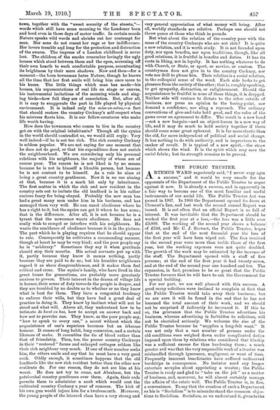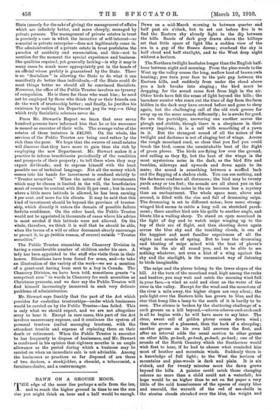THE PUBLIC TRUSTEE.
ARTEMITS WARD sagaciously said, "I never argy agin a success," and it would be very unsafe for the opponents of the Department of the Public Trustee to argue against it now. It is already a success, and is apparently in a fair way to become one of the most familiar and useful instruments of our social life. The Public Trustee Act was passed in 1907. In 1903 the Department opened its doors at Clement's Inn, and last week the second annual Report was issued. It is not often that an official Report is so full of interest. It was inevitable that the Department should be worked the first year at a loss,—the loss was a little over £3,000. The working of the second year shows a balance? of £244, and Mr. C. J. Stewart, the Public Trustee, hopes' that at the end of the next financial year the loss of the first year will have been wiped out. The fees received in the second year were more than treble those of the first year, but the working expenses were not quite doubled. The growth of the work may be estimated by the increase of the staff. The Department opened with a staff of five persons ; at the end of the first year it had twenty-seven, and at the end of the second year one hundred and ten. The expansion, in fact, promises to be so great that the Public Trustee foresees that he will have to ask the Government for a special building.
For our part, we are well pleased with this success. A good many solicitors were inclined to complain at first that the Public Trustee would take away their business ; but we are sure it will be found in the end that he has not lessened the total amount of their work, and we should not be surprised if indirectly he increased it. If this be so, the grievance that the Public Trustee advertises his business, whereas advertising is forbidden to solicitors, will not be cherished seriously. We welcome the rise of the Public Trustee because he "supplies a long-felt want." It was not only that a vast number of persons under the old conditions were weighed down under complicated duties imposed upon them by relations who considered that kinship was a sufficient excuse for thus burdening them ; a much greater evil was that the very responsible work of a trustee was mishandled through ignorance, negligence, or want of time. Frequently innocent beneficiaries have suffered undeserved hardships in consequence. No testator need any longer entertain scruples about appointing a trustee ; the Public Trustee is ready and glad to " take on the job " as a matter of business, and, moreover, he will almost certainly manage the affairs of the estate well. The Public Trustee is, in fine, a convenience. To say that the creation of such a Department as his is " Socialism" is to misunderstand the common objec- tions to Socialism. Socialism, as we understand it, gives to the
State (merely for the sake of giving) the management of affairs which are infinitely better, and more cheaply, managed by private persons. The management of private estates in trust is precisely a case in which the incentive of self-interest—so essential in private enterprise—does not legitimately come in. The administration of a private estate in trust postulates the paradox of assiduity and renunciation, and this—not to mention for the moment the special experience and business- like qualities required, yet generally lacking—is why it may in many cases be much more appropriately put in the hands of an official whose probity is guaranteed by the State. There is no " Socialism " in allowing the State to do what it can manifestly do better than individuals,—if the State could do most things better we should all be convinced Socialists. Moreover, the office of the Public Trustee involves no tyranny of compulsion. He is there for those who want him ; be need not be employed by those who think they or their friends can do the work of trusteeship better ; and finally, he justifies his existence by making his Department pay its way,—a thing which truly Socialistic schemes never do.
From Mr. Stewart's Report we learn that over seven hundred persons have informed him that he or his successor is named as executor of their wills. The average value of the estates of these testators is £42,000. On the whole, the services of the Public Trustee are being used rather by the rich than the poor. We hope that the owners of small estates will discover that they have more to gain than the rich by employing the new Department. Mr. Stewart makes it a practice to inform beneficiaries periodically of the condition and prospects of their property ; to tell them when they may expect dividends; and to express himself with the least possible use of technical language. Not all the money which comes into his bands for investment is confined strictly to " Trustee securities." When the nature of the investments which may be chosen is limited in the will, the beneficiaries must of course be content with their 31 per cent.; but in cases where a little more latitude is allowed, he has been earning 4 per cent. and more for his clients. It may be said that this kind of investment should be beyond the province of trustee- ship, which directly it enters the domain of possible failure forfeits confidence. On the other hand, the Public Trustee would not be appointed in thousands of cases where his advice is most needed if this latitude were not allowed. On the whole, therefore, we think it is well that he should be able, when the terms of a will or other document clearly encourage or permit it, to go (within reason, of course) outside " Trustee securities."
The Public Trustee resembles the Chancery Division in having a considerable number of children under his care. A lady has been appointed to the staff who visits them in their homes. Situations have been found for some, and—to take an illustration of the variety of the work—we see a mention of a great-coat having been sent to a boy in Canada. The Chancery Division, we have been told, sometimes grants "a competent sum" to wards in Chancery for such amenities as Christmas presents, and we dare say the Public Trustee will find himself increasingly immersed in such very delicate problems of administration.
Mr. Stewart says frankly that the part of the Act which provides for custodian trusteeships—under which businesses would be carried on by the Public Trustee—has failed. This is only what we should expect, and we are not altogether sorry to hear it. Except in rare cases, this part of the Act involves unnecessary expense, and it continues the system of personal trustees (called managing trustees), with the attendant trouble and expense of replacing them on their death or retirement. When the Public Trustee is executor he has frequently to dispose of businesses, and Mr. Stewart is confirmed in his opinion that eighteen months is an ample allowance as the period during which a business may be carried on when an immediate sale is not advisable. Among the businesses or practices so far disposed of are those of two doctors, a stockjobber, a chemist, a tobacconist, a furniture-dealer, and a costermonger.











































 Previous page
Previous page